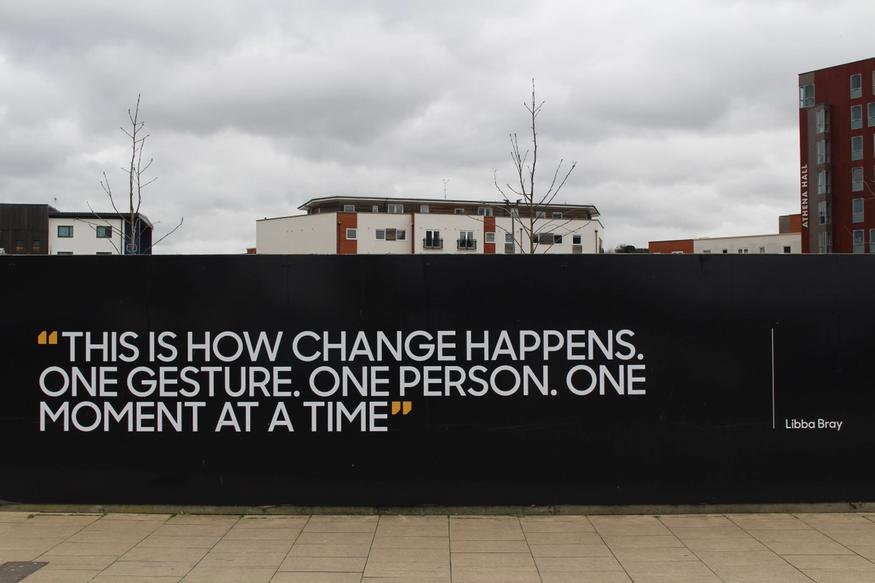How to Help Someone Who is Self-Harming
Published on 4/1/2020*The following post could be potentially triggering regarding self harm. Furthermore, I am in no way a licensed counselor, psychologist or psychiatrist. The following article reflects my own experiences and similar information obtained online or from others. If you are struggling with self harm, please look at sites such as the HelpGuide or Mind for advice from licensed professionals.*
In previous posts I’ve mentioned self-harm, including how it can fit into Borderline Personality Disorder and other mental illnesses. But now it is time to stop discussing, and start doing something.

So you think that a friend, family member or someone else is intentionally hurting themselves.
What now?
We’re going to go over how you can know if someone is self-harming, and what you can do to help someone stop self-harming. Each situation is unique, and so you should always approach it as such. Be patient, and realise that it may take time and several different approaches.
But first, it is important that you know, no matter how they react or the outcome, you are doing the right thing by researching this. You are taking a brave step into a scary territory, and possibly helping someone who really needs it. So no matter what happens, congratulations on taking that leap and making self-harm something a little less scary and a little closer to discussion.
Let’s get started.
What is Self-Harm?
Self-harm is usually a form of coping, a way of dealing with pain through inflicting pain on yourself. This can be intended as a distraction, a release for emotional pain, an expression of things you feel unable to word or self-punishment. It can be extremely addictive, with 1 in 5 females and 1 in 7 males engaging in self-harm. Furthermore, 90% of individuals who self-injure begin during their adolescence.
Self harm can look like:
- Burning/scalding
- Cutting/scratching
- Hitting yourself or other objects/walls
- Intentionally preventing wounds from healing
But many don’t realise that the following are also examples of self-harm:
- Restricting your food intake
- Binge drinking
- Taking large quantities of drugs
- Having unsafe sex
Doing those once or twice, or unknowingly, doesn’t mean you’ve self-injured. Self-harm is doing these acts continuously and intentionally with the aim of hurting yourself through them.
How to Know if Someone is Self-Harming
Despite the subtitle, there is actually no sure way to know if someone self-harms. There are a variety of ways someone may be hurting themselves, and many are easy to hide. Seeing harm on their body that looks intentional is a start. This could include frequent bruising, more than one cut or a cut in an unlikely spot for a natural incident. Seeing something can make it quite clear, but sometimes we don’t see enough to be sure but still have suspicions. You could notice they keep their body covered, even in warm temperatures, but remember this could also just be an insecurity over their appearance.
But as we know, self-harm can be more than injury related. It could also be through limiting their food intake, such as not seeing them ever eat, or suspecting that they’re puking. Keep an eye on their knuckles for any indications of bruising or injured skin. And if you think they may be suffering from an eating disorder, focus on these symptoms.
The only true way to know if someone self-harms is to ask them. If they don’t, they won’t really find it offensive, just surprising. If they do, it is possible they will get defensive or react badly. So how do we ask someone if they are self-harming?

How to Ask Someone if they are Self-Harming?
You’ve been put in an extremely difficult situation, but it is also one with a lot of power to do good. A lot of people who self-harm want it to be noticed, even if they do it somewhere subtle. This is not to say it is for attention, or that this applies to all self-harming individuals, just that there is a portion that will hurt themselves and then almost wish to get caught, to escape your struggle by having someone finally notice.
This is how you can show someone that you have noticed their struggle:
1. Choose the moment carefully. Ensure the two of you are completely alone, without fear of interruption. Make sure you’ve planned in enough time in case the discussion goes into depth. But also ensure that they have an escape if they wish, don’t do it during a trip or when they have to be somewhere. Also don’t do it before an event or seeing others, as they may get emotional. Plan it in casually, perhaps at one of your homes over some tea.
2. Don’t beat around the bush too much. This conversation is going to be incredibly difficult, but it is better to just get it over with. Don’t wait too long after noticing their self-harm, but also don’t rush it and blurt something you’ll regret. When you’re together, say there is something you’d like to discuss and express your concern.
3. Use non-judgemental language. You probably aim to do this anyways, but really focus on it. It can be hard to understand self-harm if you’ve never had that urge yourself. It isn’t some petty, childish, attention-seeking move, so make sure you don’t make them feel like that. They may be hypersensitive for such an undertone so be cautious.
Simply say that you’ve observed the following, you think they are hurting themselves, is this the case?
4. If they deny it, you can push a TINY bit. They may be avoiding it to help you, and keep things easier for you, or they may need that urge and fear losing it. So ask them if they’re sure, remind them you’re not here to judge but that you really care and want to be there for them.
5. If they admit it, maybe ask them to share their story if they feel comfortable. This could’ve been going on for a long time, and they may relish the chance to finally discuss it. Listen, ask any questions you have, and really try to understand their mindset. If you know where it is coming from and when it occurs, you are in the best position to help them.
6. Ask any questions you have, get the information you require to really understand.
7. Make sure you are cared for emotionally, as this conversation and information could weigh heavily on you. Keep their privacy, but share with someone that you had a difficult discussion or know something weighing on you. Allow someone to take on your emotional wellbeing as well, as then you’re at your best to help.

How to Help Someone Stop Self-Injuring
The hardest first step is completed, but now for resolution. Them knowing you know can help a bit, but it probably isn’t enough to put your mind at ease. The most important thing to know is that the choice to stop self-harming is one that will have to come from within. It is like any addiction, you have to want to stop to be successful. Trying to stop for others will make relapse more likely. That’s another thing, don’t be too disheartened if they slip up again once getting past it, as everyone has their weaker moments.
These are tips for helping someone stop self-harming:
1. Create an open line of communication. The first step isn’t stopping them from self-harming but being aware when they do. This sounds awful, and is not possible for all to handle, so be sure to know your limits and when this is affecting you badly.
A common mistake is to simply ask them to tell you when they want to do this. Well-intentioned, but saying the words to someone is difficult and feels embarrassing. So instead you could agree on a codeword, an easy phrase or even emoji they can send you that makes it clear. My boyfriend knows that when I say “I’m having bad thoughts”, exactly what it means and this ensures I don’t feel too uncomfortable to open up.
Ask if anything led to it, so that you can both understand the triggers, create an open space for discussion, a place where they can feel heard. And then help in distracting them. Talk about something you both like, meet up or watch a show at the same time so they feel less alone. Just be engaged with one another.
Decide if you want to know if they did it, and if you think you can handle that let them know. It can be deeply uncomfortable for them to share this, but can ensure they recognize their actions and be an extra push to avoid it.
2. Help them understand why they are doing this. Perhaps do some research together or on your own, so that they can work out their triggers. This can help you avoid triggers, e.g discussing weight, and help them know when to expect the urge.
3. Discuss strategies for when they get the urge. There are numerous ways to help avoid self-harming, and everyone is different in what works for them. Check out this blog on activities to avoid self-harming. These can range from simple distraction to redirecting that specific energy. Different things work for different people, so it will avoid some trying and some failing.
4. Encourage them to speak to a professional. This can be incredibly scary, and it may be easier to first try the online apps or websites. But help them consider the possibility of going to counseling or therapy, and accompany them to the appointment if required.

Further Action
If the person remains in denial or you feel their condition to be worsening, recognize that it may be time to get experienced help. As we said, you can’t fix them, but someone else may know how to help them fix themselves. Either in the form of a licensed professional, a trusted family member or a community that understands them.
Calling a Suicide Prevention or reaching out for help is not betraying them. You are doing this for them, and you have first tried to help them take the steps for themselves. Ensure you are comfortable with any actions you do or do not take.
A difficult topic, but hopefully one you’re glad to have addressed! Always look after yourself throughout helping another curb their self-harm, and prioritise your wellbeing. Remember that you are never responsible nor have the control to stop them, but that helping is a great start.
Featured posts

Fleur
Welcome to Symptoms of Living! A place where I like to relieve myself of the barrage of thoughts and ideas filling my mind. Here I'll take a look at various topics, from books to BPD, series to self-harm, there's nothing that we can't, and shouldn't, talk about.
Having struggled with mental illness since the age of 15, one of the hardest parts was how alone I felt in it. While mental illness is beginning to be discussed more openly, and featured in the media, I still think there is room for improvement. So whether it is mental illness or merely mental health, a bad day or a bad year, let's make this a place to approach it and strip it back. Everyone has their own symptoms of living, and you certainly won't be the only one with it.
Would you like to receive my top monthly articles right to your inbox?
For any comments/questions/enquiries, please get in touch at:
info@byfleurine.com
I'd love to hear from you!